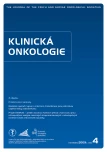Experience in Data Management of the Clinical Retrospective Project in Czech and Slovak Oncology Centres (IKARUS Project)
Authors:
K. Chroust 1; J. Fínek 2; P. Zemánek 1; P. Brabec 1; L. Dušek 1
Authors‘ workplace:
Institut biostatistiky a analýz Masarykovy univerzity, Brno, CEBO: Center for Evidence-Based Oncology, IBA MU, Brno 2Onkologické a radioterapeutické oddělení FN Plzeň
1
Published in:
Klin Onkol 2009; 22(4): 163-167
Category:
Original Articles
Overview
Backgrounds:
The retrospective part of the IKARUS Project (Incidence of Skeletal Related Events in Breast Cancer) was focused on monitoring the incidence of skeletal related events in patients with metastatic breast cancer treated in the Czech and Slovak Republics. The aim was to describe the experience with data collection management in the conditions of the Czech and Slovak Republics.
Subjects and Methods:
Retrospective collection of data in multi centre, non interventional, epidemiological and explorative studies. Female patients diagnosed since 2000 were involved in the project in order to respect the five-year period of monitoring and to describe the treatment of the period. Results: During the initiation phase of the retrospective study each of the 18 Complex Cancer Centres in the Czech Republic (see www.linkos.cz) and 18 chosen oncology centres in the Slovak Republic were addressed. In the end, data were collected from 13 oncology centres in the Czech Republic and 12 oncology centres in the Slovak Republic. The initial plan to enrol 650 patients was not completed; data on 254 patients from the Czech Republic and 125 patients from the Slovak Republic were finally analysed. The effectiveness of retrospective data collection in the conditions of Czech and Slovak oncology corresponded with the possibilities of access to data of formerly diagnosed and treated patients. In searching for retrospective data the present hospital information systems could not be used in most oncology centres. Therefore, the cost of retrospective data collection was estimated and was shown to be relatively high.
Conclusion:
The binding methodical conclusion is that unless a systemic change is made in the functionality of hospital information systems and standardised electronic documentation is introduced, the retrospective collection of clinical data in our conditions will be associated with high costs and a relatively low recovery factor.
Key words:
breast cancer – retrospective study – costs and cost analysis – medical records
Sources
1. Cassileth BR. Clinical trials: time for action (editorial). J Clin Oncol 2003; 21 : 765–766.
2. Goodwin JS, Hunt WC, Key CR. Cancer treatment protocols: Who gets chosen? Arch Intern Med 1988; 148 : 2258–2260.
3. Krzyzanowska M, Pintilie M, Tannock I. Factors associated with failure to publish large randomized trials presented at an oncology meeting. JAMA 2003; 290 : 495–501.
4. Satariano WA, Silliman RA. Comorbidity: implications for research and practice in geriatric oncology. Crit Rev Oncol Hematol 2003; 48 : 239–248.
Labels
Paediatric clinical oncology Surgery Clinical oncologyArticle was published in
Clinical Oncology

2009 Issue 4
- Possibilities of Using Metamizole in the Treatment of Acute Primary Headaches
- Metamizole at a Glance and in Practice – Effective Non-Opioid Analgesic for All Ages
- Metamizole vs. Tramadol in Postoperative Analgesia
- Spasmolytic Effect of Metamizole
- Metamizole in perioperative treatment in children under 14 years – results of a questionnaire survey from practice
-
All articles in this issue
- Primary Pulmonary Sarcomas
- IKARUS Project – Incidence of Bone Events in Breast Cancer: Retrospective Analysis of Patients in Oncological Centres in the Czech Republic and Slovakia
- Experience in Data Management of the Clinical Retrospective Project in Czech and Slovak Oncology Centres (IKARUS Project)
- Radical Surgery and Intensive Chemotherapy Are Necessaryfor Successful Treatment of Osteosarcoma
- Treatment with Sunitinib and Hypothyroidism – a Case Report and Overview of Literature
- Iris Metastasis as the First Sign of Small Cell Lung Carcinoma with Metastatic Involvement of the Mediastinum
- Palliative and Hospic Care in the Czech Republic and in Europe
- Targeted Therapies in the Treatment of Advanced Non Small Cell Lung Cancer: Update
- Clinical Oncology
- Journal archive
- Current issue
- About the journal
Most read in this issue
- Primary Pulmonary Sarcomas
- Palliative and Hospic Care in the Czech Republic and in Europe
- Radical Surgery and Intensive Chemotherapy Are Necessaryfor Successful Treatment of Osteosarcoma
- Treatment with Sunitinib and Hypothyroidism – a Case Report and Overview of Literature
